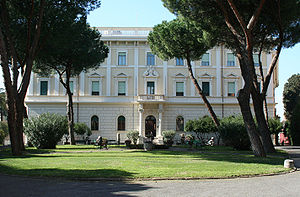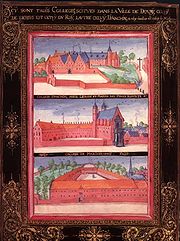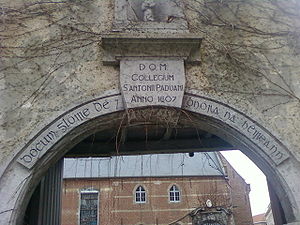
Irish College
Encyclopedia




Irish Catholic
Irish Catholic is a term used to describe people who are both Roman Catholic and Irish .Note: the term is not used to describe a variant of Catholicism. More particularly, it is not a separate creed or sect in the sense that "Anglo-Catholic", "Old Catholic", "Eastern Orthodox Catholic" might be...
clergy and lay people opened on continental Europe
Europe
Europe is, by convention, one of the world's seven continents. Comprising the westernmost peninsula of Eurasia, Europe is generally 'divided' from Asia to its east by the watershed divides of the Ural and Caucasus Mountains, the Ural River, the Caspian and Black Seas, and the waterways connecting...
in the 16th, 17th and 18th centuries. The Colleges were set up to educate Roman Catholics from Ireland
Ireland
Ireland is an island to the northwest of continental Europe. It is the third-largest island in Europe and the twentieth-largest island on Earth...
in their own religion following the takeover of the country by the Protestant English state in the Tudor conquest of Ireland. Irish Catholics also left the country to pursue military careers in the Flight of the Wild Geese
Flight of the Wild Geese
The Flight of the Wild Geese refers to the departure of an Irish Jacobite army under the command of Patrick Sarsfield from Ireland to France, as agreed in the Treaty of Limerick on October 3, 1691, following the end of the Williamite War in Ireland...
.
The first Irish Colleges were set up in Spain
Spain
Spain , officially the Kingdom of Spain languages]] under the European Charter for Regional or Minority Languages. In each of these, Spain's official name is as follows:;;;;;;), is a country and member state of the European Union located in southwestern Europe on the Iberian Peninsula...
in the 1580s in Salamanca
Salamanca
Salamanca is a city in western Spain, in the community of Castile and León. Because it is known for its beautiful buildings and urban environment, the Old City was declared a UNESCO World Heritage Site in 1988. It is the most important university city in Spain and is known for its contributions to...
and Madrid
Madrid
Madrid is the capital and largest city of Spain. The population of the city is roughly 3.3 million and the entire population of the Madrid metropolitan area is calculated to be 6.271 million. It is the third largest city in the European Union, after London and Berlin, and its metropolitan...
under the supervision of the Jesuit priest James Archer
James Archer (Jesuit)
James Archer was an Irish member of the Society of Jesus and played a controversial role in the Nine Years War, during the Tudor conquest of his native country...
.
There were several early Irish Colleges in Southern Netherlands
Southern Netherlands
Southern Netherlands were a part of the Low Countries controlled by Spain , Austria and annexed by France...
. St. Patrick Irish college of Douai
Irish College, Douai
The Irish College was a seminary at Douai, France, for Irish Roman Catholics in exile on the continent to study for the priesthood, modelled on the English College there...
was founded in 1603 by Christopher Cusack, with the support of Philip III of Spain
Philip III of Spain
Philip III , also known as Philip the Pious, was the King of Spain and King of Portugal and the Algarves, where he ruled as Philip II , from 1598 until his death...
. The Irish College at Douai was integrated to the Faculty of Theology of the University of Douai
University of Douai
The University of Douai is a former university in Douai, France. With a Middle Ages heritage of scholar activities in Douai, the university was established in 1559 and lectures started in 1562. It closed from 1795 to 1808...
in 1610.
St Anthony's College, the Irish Franciscan College in Leuven, was co-founded in May 1607 by Aodh Mac Cathmhaoil (also known as Aodh Mac Aingil) and Flaithri Ó Maolconaire, Irish Franciscan, theologian and aide to Aodh Ruadh Ó Domhnaill . The College was founded under the patronage of Philip III of Spain
Philip III of Spain
Philip III , also known as Philip the Pious, was the King of Spain and King of Portugal and the Algarves, where he ruled as Philip II , from 1598 until his death...
.
The Irish College in Paris
Irish College in Paris
The Irish College in Paris was for three centuries a major Roman Catholic educational establishment, for Irish students. It was founded in the late sixteenth century, and closed down by the French government in the early twentieth century....
was co-founded in 1605 by John Lee and John de l'Escalopier, President of the Parliament of Paris.
More Colleges were established in Rome
Rome
Rome is the capital of Italy and the country's largest and most populated city and comune, with over 2.7 million residents in . The city is located in the central-western portion of the Italian Peninsula, on the Tiber River within the Lazio region of Italy.Rome's history spans two and a half...
(1625), Toulouse
Toulouse
Toulouse is a city in the Haute-Garonne department in southwestern FranceIt lies on the banks of the River Garonne, 590 km away from Paris and half-way between the Atlantic Ocean and the Mediterranean Sea...
, Bordeaux
Bordeaux
Bordeaux is a port city on the Garonne River in the Gironde department in southwestern France.The Bordeaux-Arcachon-Libourne metropolitan area, has a population of 1,010,000 and constitutes the sixth-largest urban area in France. It is the capital of the Aquitaine region, as well as the prefecture...
, Nantes
Nantes
Nantes is a city in western France, located on the Loire River, from the Atlantic coast. The city is the 6th largest in France, while its metropolitan area ranks 8th with over 800,000 inhabitants....
, Lille
Lille
Lille is a city in northern France . It is the principal city of the Lille Métropole, the fourth-largest metropolitan area in the country behind those of Paris, Lyon and Marseille. Lille is situated on the Deûle River, near France's border with Belgium...
, Brussels
Brussels
Brussels , officially the Brussels Region or Brussels-Capital Region , is the capital of Belgium and the de facto capital of the European Union...
, Antwerp and then Prague
Prague
Prague is the capital and largest city of the Czech Republic. Situated in the north-west of the country on the Vltava river, the city is home to about 1.3 million people, while its metropolitan area is estimated to have a population of over 2.3 million...
(1631). Some of the Colleges fell out of use in the late 18th century as the Penal Laws
Penal Laws (Ireland)
The term Penal Laws in Ireland were a series of laws imposed under English and later British rule that sought to discriminate against Roman Catholics and Protestant dissenters in favour of members of the established Church of Ireland....
against Roman Catholics in Ireland were relaxed.
Irish colleges were important centres for the writing of Irish history and the preservation of Ireland’s rich cultural traditions. Mícheál Ó Cléirigh
Mícheál Ó Cléirigh
Mícheál Ó Cléirigh , sometimes known as Michael O'Clery, was an Irish chronicler, scribe and antiquary and chief author of the Annals of the Four Masters, assisted by Cú Choigcríche Ó Cléirigh, Fearfeasa Ó Maol Chonaire, and Peregrinus Ó Duibhgeannain.-Background and early life:Grandson of Tuathal...
was sent from an Irish college to Ireland to compile the Annals of the Four Masters
Annals of the Four Masters
The Annals of the Kingdom of Ireland or the Annals of the Four Masters are a chronicle of medieval Irish history...
, an important chronicle of Irish history. Within the colleges, printing press in the Irish language were established and a collection of the lives of Irish saints was produced.
Irish colleges were also helpful for the Irish resistance during the Nine Years' War in Ireland and later exile on the European continent.
On 16 October 1802, Irish colleges located in Toulouse
Toulouse
Toulouse is a city in the Haute-Garonne department in southwestern FranceIt lies on the banks of the River Garonne, 590 km away from Paris and half-way between the Atlantic Ocean and the Mediterranean Sea...
, Bordeaux
Bordeaux
Bordeaux is a port city on the Garonne River in the Gironde department in southwestern France.The Bordeaux-Arcachon-Libourne metropolitan area, has a population of 1,010,000 and constitutes the sixth-largest urban area in France. It is the capital of the Aquitaine region, as well as the prefecture...
, Nantes
Nantes
Nantes is a city in western France, located on the Loire River, from the Atlantic coast. The city is the 6th largest in France, while its metropolitan area ranks 8th with over 800,000 inhabitants....
, Douai
Irish College, Douai
The Irish College was a seminary at Douai, France, for Irish Roman Catholics in exile on the continent to study for the priesthood, modelled on the English College there...
, Lille
Lille
Lille is a city in northern France . It is the principal city of the Lille Métropole, the fourth-largest metropolitan area in the country behind those of Paris, Lyon and Marseille. Lille is situated on the Deûle River, near France's border with Belgium...
, Antwerp, Leuven
Leuven
Leuven is the capital of the province of Flemish Brabant in the Flemish Region, Belgium...
and Paris
Irish College in Paris
The Irish College in Paris was for three centuries a major Roman Catholic educational establishment, for Irish students. It was founded in the late sixteenth century, and closed down by the French government in the early twentieth century....
were merged under a unique administration, alongside the Scottish College in Douai
Scottish College, Douai
The Scottish College or Scot's College at Douai was a seminary founded in Douai, France, for the training of Scottish Roman Catholic exiles for the priesthood...
and Scots College in Paris
Scots College (Paris)
The Scots College was a college of the University of Paris, France, founded by an Act of the Parlement of Paris on 8 July 1333. The act was a ratification of an event that had already taken place, the founding of the Collegium Scoticum, one of a number of national colleges into which the...
.
In the last decade, the Irish Government
Irish Government
The Government of Ireland is the cabinet that exercises executive authority in Ireland.-Members of the Government:Membership of the Government is regulated fundamentally by the Constitution of Ireland. The Government is headed by a prime minister called the Taoiseach...
has financed the renovation of the premises of the Irish College in Paris
Irish College in Paris
The Irish College in Paris was for three centuries a major Roman Catholic educational establishment, for Irish students. It was founded in the late sixteenth century, and closed down by the French government in the early twentieth century....
which now serves as an Irish Cultural Centre and a residence for Irish students, writers and artists. The Pontifical Irish College in Rome continues to be used for the education and training of Roman Catholic clergy. In 1983 the Irish College in Leuven was made available by the Irish Franciscans for development as a secular resource, The Leuven Institute for Ireland in Europe is now located on the premises.
See also
- Irish College, Douai (France)Irish College, DouaiThe Irish College was a seminary at Douai, France, for Irish Roman Catholics in exile on the continent to study for the priesthood, modelled on the English College there...
- Irish College in Paris (France)Irish College in ParisThe Irish College in Paris was for three centuries a major Roman Catholic educational establishment, for Irish students. It was founded in the late sixteenth century, and closed down by the French government in the early twentieth century....
- Pontifical Irish College, Rome (Italy)Pontifical Irish CollegeThe Pontifical Irish College is a Roman Catholic seminary for the training and education of priests, in Rome.-Foundation and early history:Towards the close of the sixteenth century, Pope Gregory XIII had sanctioned the foundation of an Irish college in Rome, and had assigned a large sum of money...
- Early Modern Ireland 1536-1691
- James Bartholomew BlackwellJames Bartholomew BlackwellJames Bartholomew Blackwell was an Irish born mercenary and French Army officer serving the First French Republic and later under Napoleon. He also played a role in the 1798 Rebellion.- Education :...
- revolutionary soldier - Nicholas FrenchNicholas FrenchNicholas French , Roman Catholic Bishop of Ferns, was an Irish political activist and pamphleteer, who was born at Wexford....
- Colegio Mayor de Santiago el Zebedeo, Salamanca (Spain)Colegio Mayor de Santiago el ZebedeoThe Colegio Mayor de Santiago, el Zebedeo, Colegio del Arzobispo or Colegio Mayor de Fonseca is a historical edifice in Salamanca, Spain, founded in 1519 by Alonso de Fonseca, archbishop of Santiago de Compostela , in order to provide Galician students with a college in which to study within the...
External links
- Irish Colleges on the European Continent - Catholic Encyclopedia
- Irish College in Rome - Catholic Encyclopedia
- http://www.irishcollege.org - official site of the only remaining college on the continent, the Pontifical Irish College Rome
- The National Library of Ireland's current exhibition, Strangers to Citizens: the Irish in Europe, 1600-1800
- Irish College Leuven
- Pontifical Irish College Rome

